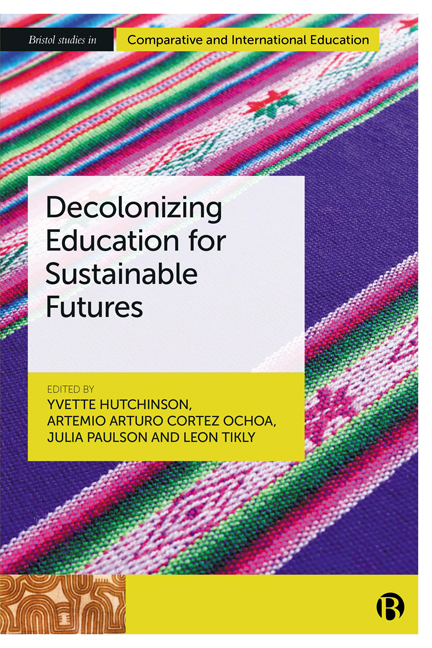Book contents
- Frontmatter
- Contents
- Series Editor Preface
- List of Figures and Table
- List of Abbreviations
- Notes on Contributors
- Acknowledgements
- Introduction
- PART I Connecting Decolonial and Sustainable Futures in Education
- PART II Decolonizing Education for Sustainable Futures: From Theory to Practice
- PART III Education’s Reparative Possibilities: Responsibilities and Reckonings for Sustainable Futures
- Conclusion
- Afterword
- Index
9 - Indigenous Education and Activism: Dignity and Repair for Inclusive Futures
Published online by Cambridge University Press: 18 January 2024
- Frontmatter
- Contents
- Series Editor Preface
- List of Figures and Table
- List of Abbreviations
- Notes on Contributors
- Acknowledgements
- Introduction
- PART I Connecting Decolonial and Sustainable Futures in Education
- PART II Decolonizing Education for Sustainable Futures: From Theory to Practice
- PART III Education’s Reparative Possibilities: Responsibilities and Reckonings for Sustainable Futures
- Conclusion
- Afterword
- Index
Summary
This chapter reprints in English and Spanish (versión en español disponible abajo) the contributions of Tarcila Rivera Zea to the UNESCO CIRE seminar series. She spoke in the session entitled ‘Education's Reparative Possibilities: Responsibilities and reckonings for sustainable futures’ held on 24 February 2020. In the session, Rivera Zea argued that reparative and healing education must be based on dignity and dialogue across differences to repair the harms of colonization and discrimination, sharing her experiences as an Indigenous rights activist.
Tarcila Rivera Zea is an Indigenous Quechua activist from Ayacucho, Peru, and founder of CHIRAPAQ (Centre for Indigenous Cultures of Peru). She is a member of the United Nations Permanent Forum on Indigenous Issues and, in 2011, received the Visionary Award from the Ford Foundation.
Nanaykuna, Turiykuna, ukun sunquymantam rimaykamuychik llapankichiqta. Runasimi rimaqmi kani, Inkakakunapa wawanmi kani, tawantinsuyumanta hamun. From the bottom of my heart, with my sincerest regards, I greet you all in my mother tongue, Quechua, which is the language of the Incas. Globally, we have to allude to the Incas because this is the civilization we come from in this part of the world where I am speaking to you from. I want to thank the organizers for this opportunity to share some words, thoughts and hopes. I also want to congratulate the university and its partnership with UNESCO for creating a broader and global space for discussion that is possible thanks to online technologies.
Indigenous people are more than 480 million of the world's population divided into seven geo-cultural regions, and this is how we participate in the United Nations. In the American continents, we are nearly 60 million people. Since colonial times, Indigenous people have gone through all kinds of attempts to dissuade us from being who we are. We have been through invasion, colonization, evangelization, ideologization and politicization. More recently, colonies started to dissolve, and states, nations and republics began to form. We have also participated in these developments with the hope for freedom to gain our legitimate rights in a new state – a democratic state, at least, theoretically. However, the establishment of republics and countries in our traditional land areas has not brought about the acknowledgement and legitimization of rights for the people and cultures preceding colonization.
- Type
- Chapter
- Information
- Decolonizing Education for Sustainable Futures , pp. 173 - 181Publisher: Bristol University PressPrint publication year: 2023



